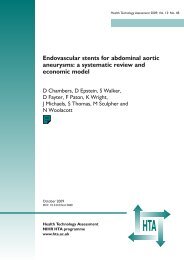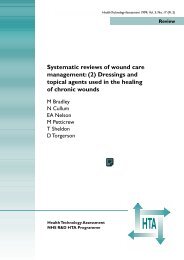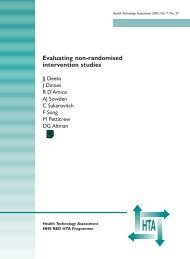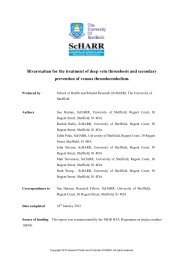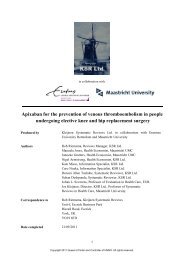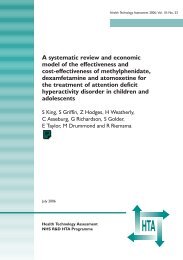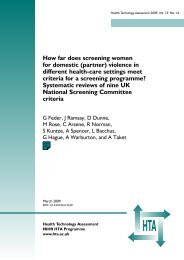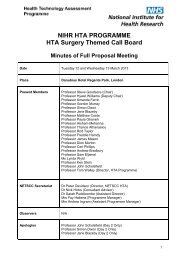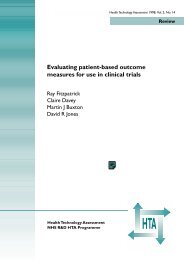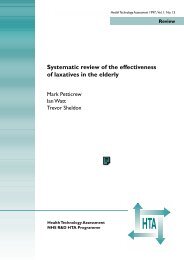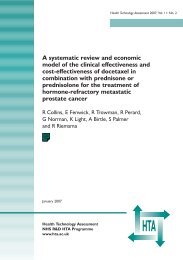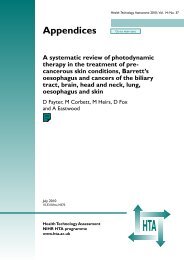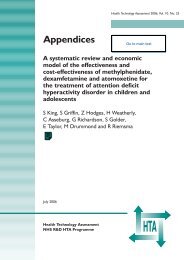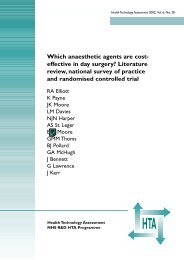Donepezil, rivastigmine, galantamine and memantine for ...
Donepezil, rivastigmine, galantamine and memantine for ...
Donepezil, rivastigmine, galantamine and memantine for ...
Create successful ePaper yourself
Turn your PDF publications into a flip-book with our unique Google optimized e-Paper software.
150<br />
Discussion <strong>and</strong> conclusions<br />
Strengths <strong>and</strong> limitations of the<br />
review<br />
This review has a number of strengths which lead<br />
to a minimisation of bias. The review is<br />
independent of any vested interest <strong>and</strong> it brings<br />
together the evidence <strong>for</strong> the effectiveness of<br />
donepezil, <strong>rivastigmine</strong>, <strong>galantamine</strong> <strong>and</strong><br />
<strong>memantine</strong> <strong>for</strong> AD, by the application of<br />
consistent methods of critical appraisal. It was<br />
guided by the principles <strong>for</strong> undertaking a<br />
systematic review <strong>and</strong> prior to undertaking the<br />
review, the methods were set out in a research<br />
protocol (Appendix 2). This protocol defined the<br />
research question, inclusion criteria, quality<br />
criteria, data extraction process <strong>and</strong> methods<br />
employed to undertake the different stages of the<br />
review. Finally, an advisory group has in<strong>for</strong>med the<br />
review from its initiation, through the<br />
development of the research protocol <strong>and</strong><br />
completion of the report.<br />
There were certain limitations placed upon this<br />
review. Despite being guided by the principles <strong>for</strong><br />
undertaking a systematic review, owing to time<br />
restrictions placed upon the review authors of<br />
references were not contacted <strong>for</strong> further details of<br />
their trials where data were lacking. As published<br />
papers are usually limited to 2500–5000 words it<br />
may be that some details of the trials are not<br />
published.<br />
Implications <strong>for</strong> further research<br />
The review has identified a wide range of<br />
subjective outcome measures among the included<br />
trials. The review has also noted that it is often<br />
unclear how statistically significant changes on<br />
these outcome measures translate into real benefit<br />
<strong>for</strong> the person with AD <strong>and</strong> <strong>for</strong> their carers. In<br />
many cases there is also uncertainty about the<br />
reliability <strong>and</strong> validity of the outcome measures<br />
used <strong>for</strong> these populations. Further research is<br />
required to answer a number of related questions<br />
(these may or may not need to be carried out<br />
separately <strong>for</strong> the population with mild to<br />
moderately severe AD <strong>and</strong> the population with<br />
moderately-severe to severe AD).<br />
● To review the evidence base of the psychometric<br />
properties of key measures of global, cognitive,<br />
functional, behavioural <strong>and</strong> mood <strong>and</strong> QoL<br />
outcomes <strong>for</strong> the population of people with AD.<br />
In future research can be focused on using the<br />
most reliable <strong>and</strong> valid measures <strong>for</strong> this<br />
population.<br />
● To investigate the correlation between statistical<br />
improvements on these key measures with<br />
perceived patient <strong>and</strong> carer benefit.<br />
● To develop QoL measurement scales that are<br />
reliable <strong>and</strong> valid <strong>for</strong> the population with AD<br />
<strong>and</strong> their carers.<br />
The review found only a few trials with a duration<br />
of follow-up of ≥12 months. The extent to which<br />
benefits on outcomes are maintained in patients<br />
over longer periods cannot be unequivocally<br />
assumed. It would be desirable to assess the effects<br />
of these drugs over long periods of follow-up;<br />
however, placebo-controlled r<strong>and</strong>omised trials are<br />
now unlikely to be ethically acceptable. It may be<br />
possible to undertake a r<strong>and</strong>omised ‘withdrawal’<br />
trial after long-term treatment, r<strong>and</strong>omising to<br />
either continued treatment or placebo.<br />
The review identified only three r<strong>and</strong>omised<br />
comparisons between the different cholinesterase<br />
inhibitors. These comparisons were small scale<br />
<strong>and</strong> offered very little to the evidence base<br />
regarding which intervention is most beneficial to<br />
patients. Larger, long-term RCTs comparing<br />
cholinesterase inhibitors in those with mild to<br />
moderately severe AD on outcomes such as<br />
cognition, function (ADLs), <strong>and</strong> behaviour <strong>and</strong><br />
mood are required.<br />
Few studies of <strong>memantine</strong> have been undertaken<br />
on patients with moderately severe to severe AD.<br />
Further RCTs comparing the effects of <strong>memantine</strong><br />
with placebo in these populations on measures of<br />
function, behaviour <strong>and</strong> mood <strong>and</strong> carer QoL are<br />
required to in<strong>for</strong>m any future up-date of the<br />
present review.<br />
Research is required on the effectiveness of<br />
treatment on patient outcomes, such as healthrelated<br />
QoL, need <strong>for</strong> institutional care <strong>and</strong> delay<br />
in disease progression as defined by measures<br />
other than cognitive function alone.<br />
Research on the prediction of disease progression,<br />
using a broad range of AD signs <strong>and</strong> symptoms (to<br />
include ADL <strong>and</strong> functional outcomes), is required.<br />
There appears to be an absence of data to model<br />
disease progression using multivariate analysis,<br />
including functional outcomes <strong>and</strong> measures of<br />
ADL, <strong>and</strong> initiatives to collect such data in an<br />
unbiased, methodologically rigorous <strong>and</strong> credible<br />
manner, should be encouraged. The current<br />
methods available to model disease progression<br />
over time are dominated by the use of cognitive<br />
function (MMSE), which is regarded as an<br />
insufficient marker of disease progression <strong>for</strong> AD.



